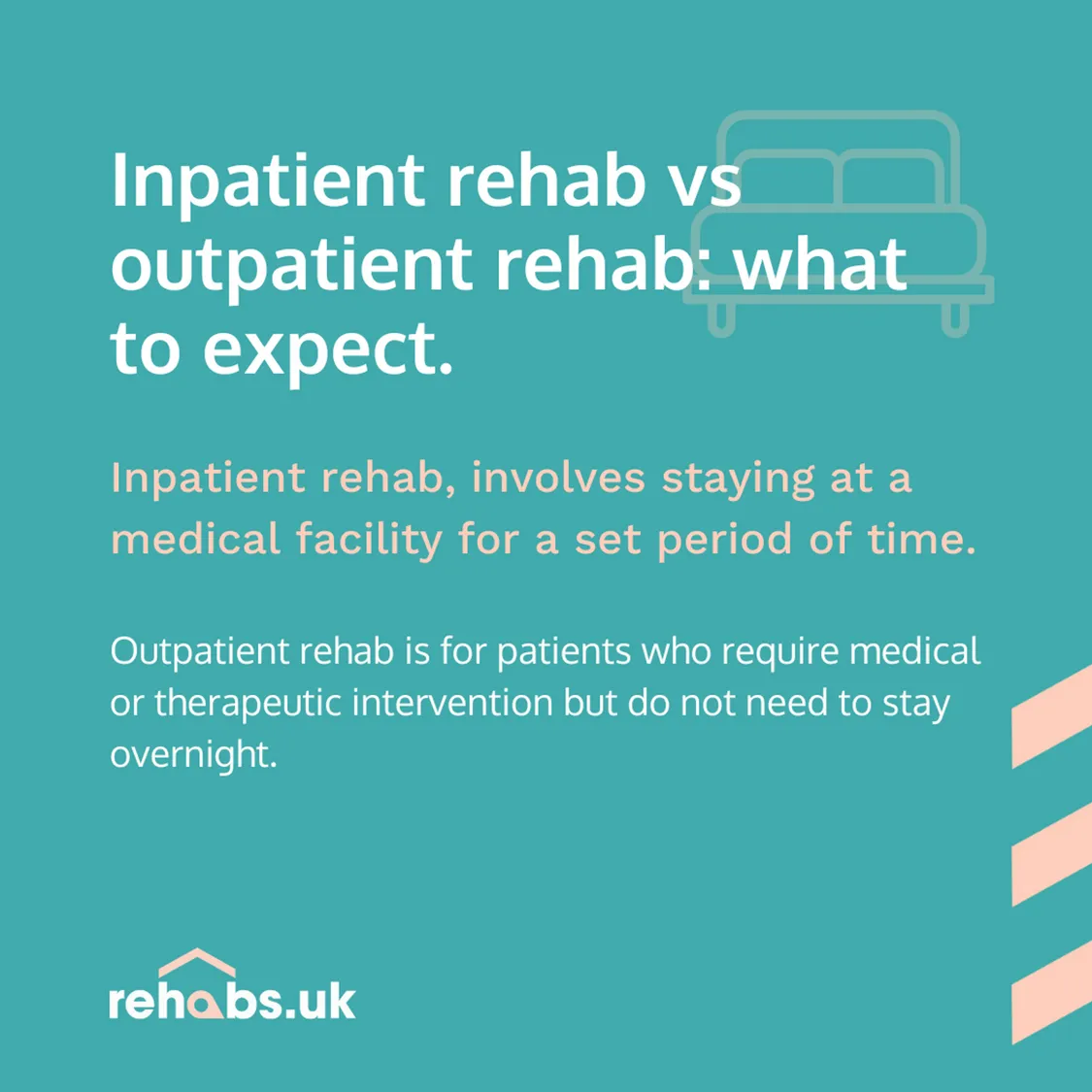24 Feb 2023
What is inpatient rehab?
Inpatient rehabilitation, also known as inpatient rehab, is a form of medical treatment and rehabilitation that takes place in a hospital or other medical facility. It involves a patient staying overnight at the facility for a set period, typically ranging from a few days to several weeks.
Inpatient rehabilitation is designed for individuals who require more intensive and comprehensive medical care and rehabilitation services than can be provided on an outpatient basis. This type of treatment is typically recommended for individuals who have suffered a serious injury, illness, or disability, or who have recently undergone a major surgical procedure.
During inpatient rehabilitation, patients receive round-the-clock care and support from a team of medical professionals, including doctors, nurses, physical therapists, occupational therapists, and speech therapists. They may also receive support from psychologists, social workers, and other mental health professionals, as needed.
What happens at an inpatient rehab?
During inpatient rehabilitation, patients participate in a variety of activities and therapies designed to help them recover from their injury, illness, or disability. Some of the common components of inpatient rehabilitation include:
- Physical therapy: This type of therapy focuses on helping patients regain their strength, mobility, and independence through exercises and activities that are tailored to their specific needs.
- Occupational therapy: This type of therapy helps patients learn or relearn the skills needed for daily living, such as dressing, grooming, and eating.
- Speech therapy: This type of therapy is designed to help patients who have difficulty speaking, swallowing, or communicating effectively.
- Psychological support: Patients may receive support from mental health professionals to help them cope with the emotional and psychological effects of their injury or illness.
- Medical management: Patients receive round-the-clock medical care and monitoring from a team of healthcare professionals to manage any medical issues that arise.
- Education and training: Patients may receive education and training on how to manage their condition, how to perform self-care, and how to use assistive devices, if needed.
The specific components of an inpatient rehabilitation programme will vary depending on the patient's individual needs and goals. The goal of inpatient rehabilitation is to help patients recover as much physical, cognitive, and emotional functioning as possible while preparing them for a successful transition back to their homes and communities.
Is inpatient rehab the same as residential rehab?
Inpatient rehab and residential rehabilitation are similar in some ways, but they are not exactly the same thing.
Inpatient rehab refers to a type of medical rehabilitation that takes place in a hospital or other medical facility, where patients stay overnight for a set period of time.
Residential rehab, on the other hand, refers to a type of addiction treatment that takes place in a residential setting, such as a rehabilitation centre or a sober living facility. Residential rehab is designed for individuals who have substance abuse or addiction problems and who require a structured and supportive environment to help them overcome their addiction.
So, while both inpatient rehab and residential rehab involve staying overnight at a treatment facility, the types of treatment and the goals of the treatment programs are different. Inpatient rehab is primarily focused on medical rehabilitation, while residential rehab is primarily focused on addiction treatment.
What is outpatient rehab?
Outpatient rehab is a form of medical treatment and rehabilitation that allows patients to receive care and support without staying overnight at a hospital or other medical facility. Outpatient programmes are designed for individuals who require medical or therapeutic intervention, but who do not need the intensive and comprehensive services provided in an inpatient setting.
What happens in outpatient rehab?
Outpatient rehab typically involves regular appointments with healthcare professionals, such as doctors, physical therapists, and mental health counsellors, for a specified period of time. Patients may attend therapy or rehabilitation sessions several times a week, or as needed, and then return home or to their community after each session.
Some common types of outpatient rehab include physical therapy for patients recovering from injuries or surgeries, occupational therapy for patients who need assistance with daily living skills, and mental health therapy for patients who are struggling with emotional or psychological issues.
How do inpatient and outpatient rehabs compare? Which is best?

The benefits of inpatient rehab
Inpatient or residential rehab offers several benefits to individuals who require medical or therapeutic intervention, especially for those who have a more severe medical condition or who have limited support in their home and community. Some of the benefits of inpatient or residential rehab include:
- Intensive treatment: Inpatient or residential rehab provides a high level of intensity and frequency of treatment, allowing patients to make rapid progress and achieve their rehabilitation goals more quickly.
- Round-the-clock care: Inpatient or residential rehab provides patients with 24/7 access to medical professionals, who can monitor their condition and provide medical care as needed.
- Structured environment: Inpatient or residential rehab provides a structured and supportive environment, which can be especially important for individuals who are struggling with addiction or who need help managing their medical condition.
- Peer support: Inpatient or residential rehab allows patients to interact and connect with others who are facing similar challenges, which can provide a sense of comfort and encouragement and can help foster a sense of community.
- Focus on recovery: Inpatient or residential rehab allows patients to focus solely on their recovery, without distractions or the stress of daily life. This can be especially beneficial for individuals who are struggling with addiction or who need help managing a complex medical condition.
- Medical monitoring: Inpatient or residential rehab provides continuous medical monitoring, which can help identify and address any medical issues as they arise, and ensure that patients receive the care they need to make a full recovery. If the individual is physically dependent on a substance this can be removed with a detox arranged by the facility. It is important to note that inpatient or residential rehab is typically more expensive than outpatient rehab, and patients may need to pay for room and board and other associated costs of staying in a medical facility. However, for individuals who need a high level of support and who require a more intensive and comprehensive rehabilitation program, inpatient or residential rehab can be an effective and life-changing option.
The benefits of outpatient rehab
- Outpatient rehab can offer several benefits to patients who require medical or therapeutic intervention, but who do not need the intensive and comprehensive services provided in an inpatient setting. Some of the benefits of outpatient rehab include:
- Cost-effectiveness: Outpatient rehab is typically less expensive than inpatient rehab, as patients do not need to pay for room and board and other associated costs of staying in a medical facility. Depending on the individuals physical and mental situation a detox at home if necessary can be organised as part of their treatment.
- Convenience: Outpatient rehab allows patients to receive care and support without having to disrupt their daily lives. They can continue to work, attend school, and care for their families while participating in therapy and rehabilitation.
- Familiar environment: Outpatient rehab allows patients to remain in their own homes and communities, which can provide a sense of comfort and stability and can be especially important for individuals who have a strong support network in place.
- Flexibility: Outpatient rehab programmes can be designed to accommodate the individual needs and schedules of patients, allowing them to receive care and support at a time that works best for them.
- Independence: Outpatient rehab can help patients develop and maintain their independence, as they learn how to manage their medical condition and perform self-care without relying on round-the-clock support from medical professionals. However, it is important to note that the level of support and the intensity of therapy provided in an outpatient setting may be less than what is provided in an inpatient setting, and the overall progress of patients may be slower. Outpatient rehab may not be suitable for all patients, particularly those who have a more severe medical condition or who have limited support in their home and community.
How long does rehab last?
The length of time that a person spends in rehab depends on several factors, including the type and severity of their medical or addiction issue, their overall health and well-being, and the specific goals of their rehabilitation program.
In general, inpatient or residential rehab programmes can last anywhere from a few days to several months. The length of time that a person spends in rehab may also depend on their progress and the recommendations of their healthcare team. For example, a person who is recovering from a minor injury may only need to participate in an outpatient rehab programme for a few weeks, while someone who is struggling with addiction may need several months of inpatient treatment.
Outpatient rehab programmes may be shorter in duration, typically lasting several weeks to a few months, while some individuals may participate in ongoing outpatient care for a longer period of time.
It is important to remember that recovery from a medical condition or addiction is a process that can take time, and that the goal of rehabilitation is not to simply "complete" a programme, but to achieve long-term health and well-being. Many people may find that they need to continue participating in therapy or support groups even after they have completed a formal rehab programme, in order to maintain their progress, adjust to life after rehab and continue to grow and recover.
Start your rehab journey with Rehabs UK
Rehabs UK can be a useful resource for individuals who are seeking information and support on their rehab journey. If you or a loved one is looking to start a rehab programme, you can reach out to Rehabs UK for more information and advice on the best options available to you.
To get in touch with Rehabs UK, visit our website or contact our fully-trained treatment advisors directly by phone or email. They will be able to answer any questions you have and provide you with the information and support you need to make an informed decision about your rehab journey.
